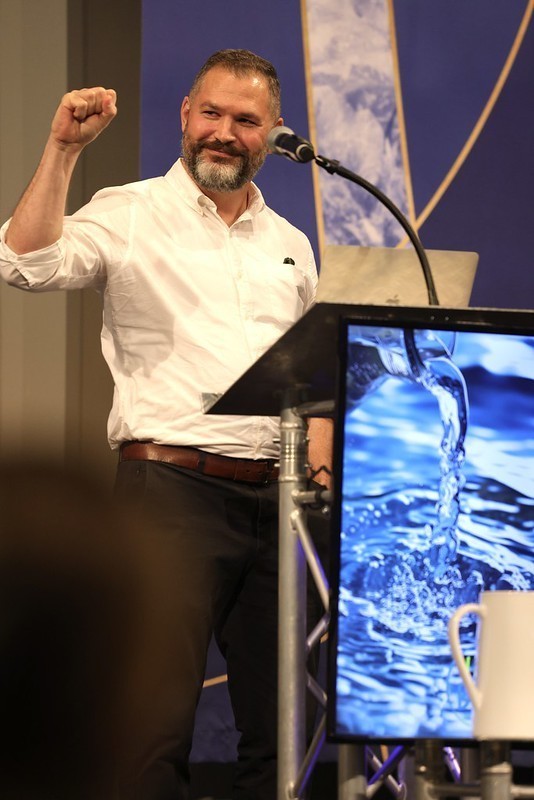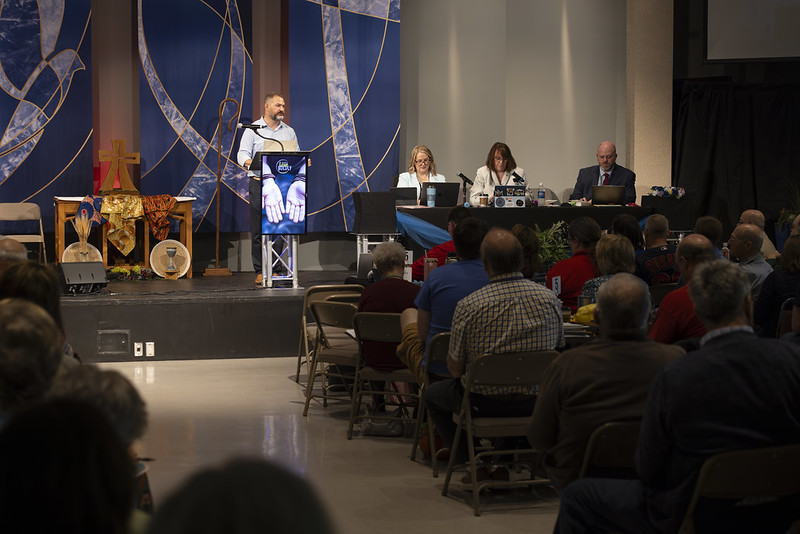
Rev. Dr. Tim Eberhart stirs Fireseeds of Renewal in the Dakotas

Rev. Dr. Tim Eberhart presenting as the Theologian in Residence at the 2025 Dakotas Annual Conference. Photos by jlynn studios.
"I cannot put into words how good it is to be here, at annual conference, on this campus, at the invitation of the Bishop, to reflect with you about our Wesleyan/Methodist identity," shared Rev. Dr. Tim Eberhart, as he opened his time as the theologian in residence for the 2025 Dakotas Annual Conference session. "I've been exhilarated – and terrified – ever since I was asked."
An ordained elder from the Dakotas, Dr. Eberhart presented a two-part teaching session entitled "The Fireseeds of Renewal." Drawing from John Wesley's quote, as he described his childhood experience of being saved from a house fire – "Like a brand plucked from the fire" – Eberhart drew on the metaphor of a destructive forest fire, the new life that can come from that, and the seeds that are set free by the fire. "Fire-activated seeds. Firebrands, saved from the burning, actually activated by the fire, in order to be the bearers of new life," he explained.
Using terms like intersystemic crisis and polycrisis, Eberhart set the stage by naming the stark reality of the multitude of crises we face as a global society. "I'm going to embrace the spiritual and psychological wisdom that affirms the therapeutic importance of facing into what is most difficult, and say out loud what I believe to be true about our time: it is that bad. What we feel, what we intuit, is real. What our young people sense and are signaling in so many ways is real," stated Eberhart.
Drawing from the words of the biblical prophets Amos, Zechariah, and Isaiah, Eberhart described the scriptural accounts of seasons of injustice and devastation as well as the consequences of such behaviors on the part of God's people. Yet, it is from those very accounts that we also draw words of hope and encouragement.
"[It is that image] of a fire seed inspired by the biblical prophets who continue to give us the courage to speak realistically and critically and yet at the same time, hopefully in the assurance of God's providential sustainment," emphasized Eberhart.
With this picture painted and biblical context explained, Eberhart invited attendees to discuss the first of several reflection questions:
Question: How does it feel to be called to ministry in a time of poly-crisis?
In both sessions, Eberhart focused on the unique characteristics of the Wesleyan-Methodist tradition—these "fire seeds"—that we can utilize not only to navigate crises but also to thrive amidst them.
"What we can be confident in saying is that our Wesleyan Methodist tradition contains unique charisms, perfectly suited for this time, just waiting to be reactivated amidst the heat in order to give life to whoever might follow."
Fire Seed 1: Following Jesus in Active Discipleship
"Amidst the uncertainties of this time in our denomination's history, amidst the great upheavals and ominous trends of our time, what our tradition tells us is this: come what may, the surest way forward is to stay focused on following Jesus in living, active, and yes costly, discipleship," said Eberhart.
It is this intentional practice of discipleship that anchors Methodists amid crises and also shapes how we respond to the call to be ambassadors of Christ in the world.
Eberhart quoted theologian Thomas a Kempis who, living during a time of widespread suffering and death due to the bubonic plague, called for "Christians to do nothing more, and nothing less than to imitate the way of Christ in all things."
In a time when people may feel helpless to change the circumstances of the world around them, it is this intentional discipleship – having the same heart, mind, words, and actions of Jesus – that can unleash new life.
Question: How is your ministry inviting persons to follow Jesus in active discipleship as a whole way of life?

Attendees listening to Rev. Dr. Tim Eberhart's teachings.
Fire Seed 2: The Christian Life is Inherently Social
"We heirs of a tradition that has renewed spiritually and numerically every time that we have nurtured the fire seed of social holiness should be emboldened to embrace again the core organizing method of United Methodism," Eberhart said.
Eberhart discussed the foundational structure of Methodism, emphasizing Wesley's belief that Christianity is inherently a social religion that finds meaning through relationships. The societies, classes, and bands were essential to Methodism's mission, which aimed to foster growth in Christlikeness by watching over one another in love.
"What [Wesley] affirmed was first, that the gift of transformation and growth in holiness – or becoming more like Jesus – is dependent upon the grace of God received in and through community, in and through relationship with others," explained Eberhart. "And second, he's affirming that the aim of spiritual transformation is right relationship to God, to neighbor, and to the creation. In other words, Wesley believed that both the means and the end of the Christian life are social; they're relational."
Question: How have you experienced the transformative power of "little churches within the church" who "watch over one another in love"?
Fire Seed 3: Fostering Lifelong Education for All
The third fire seed is the value of fostering lifelong education for all. This emphasis on education was not intended to promote intellectual elitism but rather, like the other fire seeds, to foster growth in Christlike character and practice.
"This is an affirmation that study, knowledge, even doctrinal claims, yes, they have their proper place, even an essential one, but they are to be used to cultivate holy lives marked by the humble love of God and neighbor," described Eberhart.
Eberhart recounted how Wesley promoted "whole person, common-good oriented education for all people" as a means of caring for the most vulnerable in society, particularly those in poverty. This fire seed is one that we must reactivate in our time.
"We're going to have to be intentional to commit time, energy, and resources because we can't just depend upon what has been," urged Eberhart. "Whole person education for the common good is more vulnerable today than it has been in generations."
Question: How today might we cultivate lifelong learning guided by love for the benefit of all?
Fire Seed 4: Radical Equality of All Persons
During times of crisis and upheaval, people are even more susceptible to adopting mindsets and engaging in actions that foster dehumanization and fail to see the Imago Dei in others.
"There seems to be some distorted psychological comfort to be found in fixing firm boundaries defaulting to dominator logics and asserting supremacy by demonizing or denigrating the other," explained Eberhart.
Tracing this fire seed through Christian history – from the Old Testament prophets to Jesus, into the monastic and lay apostolic traditions, on to the Pietists and Wesleyans – Eberhart described Wesley's emphasis on intentional practices that would help Methodists cultivate this charism. Visiting the sick, the lonely, the prisoner, staying in close proximity to the poor and marginalized, and speaking out against those who prioritized monetary gains or the wellbeing of humans were the "methods" that shaped the lives of early Methodists and are still relevant today.
"When United Methodists stand on the side of racial justice, the preservation of human dignity, and a society that works for all, they are acting as Bible-believing, orthodox Christians as towers contemporary," said Eberhart.
Question: Where or how today are we being called to fight for the equality of all persons, especially the impoverished and oppressed?

Rev. Dr. Tim Eberhart concluding his teachings.
Fire Seed 5: The Being and Work of God is Love
As he moved to the final Fire seed, Eberhart reminded conference attendees that what we believe about who God is and how God works is an integral part of our DNA, distinguishing us from other theological traditions.
"Wesley insisted that any theological belief that limits God's love for a select few is utterly irreconcilable with the whole tenor and scope of scripture," explained Eberhart. "For it is not written in the Bible, he argued, that God is justice or that God is truth, but rather that God is love."
This understanding of the nature and work of God will fuel the other fire seeds – shaping our intentional discipleship, forming our relationships of mutuality and welcome, empowering us to commit to lifelong learning for ourselves and others, and driving us to work toward equality and human flourishing for all people.
"The rigorous educational curriculum for we, the people called Methodists, in our little 'schools of love,' our 'workshops of the Holy Spirit,' our 'holy clubs for sinners on the way to salvation' must necessarily be lifelong, ongoing, progressive for each and every one of us," urged Eberhart. "Clergy and laity, members and non-members, children, youth, adults and elderly. All of us together watching over one another as we better learn how to love all the way to love's ultimate reign."
Question: How will we bear witness today bodily and materially to the fleshed love of God in Jesus on the way to a new creation?
As Eberhart reflected on his time in the Dakotas, he shared, "I so enjoyed the sweet, generous spirit I experienced the entire conference. The hope-filled energies were everywhere apparent. It was such an honor to be invited to offer the teaching sessions, especially among so many dear friends, colleagues, and mentors."
When asked what he hoped attendees would take away from the teaching time, he replied, "My deepest hope is that attendees came away encouraged and emboldened to embrace the unique gifts of our tradition, to experiment with new ways of being Wesleyan/Methodist today, and to be assured that the Spirit of resurrection is with us, and working through us, as we bear witness to the promise of new life through the powerful love of God."
View the full teachings: Session 1, Session 2
We invite you to provide answers to the discussion questions: Session 1, Session 2